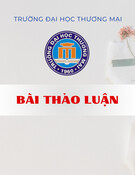
104 Journal of Development and Integration, No. 79 (2024)
No. 79 (2024) 104-115 I jdi.uef.edu.vn
K E Y W O R D S A B S T R A C T
Attracting FDI,
corruption index difference,
economic freedom,
culture distance,
population size,
GDP per capita.
Foreign direct investment (FDI) plays an important role in promoting the development of
emerging economies. This study evaluates the impact of differences in macroeconomic
factors, institutional quality and culture between the country deploying FDI and Vietnam
on FDI inflow of Vietnam. The data sample includes 32 main partners deploying FDI
in Vietnam in the period from 2002 to 2021. The author simultaneously uses Random
effect, Ordinal least square regression with Driscoll and Kraay and Generalized Method
of Moments (GMM) regression method on the panel data sample to ensure the rigor of
the research results. The research contributes to the FDI empirical studies by showing
the heterogeneities between the home country and Vietnam such as cultural distance,
differences in corruption level, economic freedom, GDP per capita and population
size impact the inflow FDI of Vietnam. The results have important implications for
Vietnam government to develop appropriate policies attracting FDI in the context of
globalization.
* Corresponding author. Email: quynhltp@uef.edu.vn
https://doi.org/10.61602/jdi.2024.79.12
Received: 01-Sep-24; Revised: 03-Nov-24; Accepted: 13-Nov-24; Online: 29-Nov-24
ISSN (print): 1859-428X, ISSN (online): 2815-6234
Lam Thanh Phi Quynh*
Ho Chi Minh City University of Economics and Finance, Vietnam
Differences in macro indicators and culture between home and
host countries: The effects on FDI inflow of Vietnam
1. Introduction
After Vietnam opened its economy and integrated
internationally, the Vietnamese government always
focus on attracting FDI. Total registered foreign
investment capital in Vietnam grew continuously
in the period 2010 - 2019. Total registered FDI in
2019 reached 38.9 billion USD. In 2020, due to
the impact of the Covid -19 epidemic, FDI capital
decreased to 31.04 billion USD. But after that,
registered FDI capital recovered in 2021 and 2022
reaching 38.85 billion USD and 29.28 billion USD
respectively.
Foreign investment capital in Vietnam plays
an important role in promoting economic growth,
contributing to total export turnover, enhancing
employment opportunities and improving people’s
lives. On the other hand, attracting foreign
investment also contributes to increasing budget
revenue and improving the national balance of
payments.
During the period 2011 - 2015, the contribution
level of the FDI sector to Vietnam’s GDP reached
21.52%. This ratio increased to an average of
25.1% in the period 2016 - 2020. Besides, the
contribution proportion of the FDI sector in total

105
Journal of Development and Integration, No. 79 (2024)
export turnover has increased rapidly, from 30%
in 1997 - when Vietnam joined ASEAN to 65%
in the period 2011 - 2015 and about 71% in the
period 2016 - 2020. For the labor market, the FDI
sector has contributed to creating jobs, improving
the quality of human resources and bringing
high income to workers. In 2011, the FDI sector
provided jobs for 2.1 million workers (accounting
for 4.2% of the total number of labor force), by
2015 it was about 3.2 million workers (accounting
for 6%) and increased to 4.59 million workers
in 2021 (accounting for 9.35%). In addition, the
FDI sector also contributes positively to the state
budget. On average in the period 2011 - 2015, the
FDI sector contributed about 12.65%. In the period
2016 - 2022, the contribution was 13.8% of total
state budget revenue.
Derived from the OLI (eclectic paradigm)
theory of Dunning (1980), FDI can be categorized
into 4 types: market-seeking, resource-seeking,
efficiency-seeking, and strategic-asset seeking. For
the purpose of searching for markets, multinational
corporations (MNCs) often deploy FDI to countries
with large populations and high per capita income
(Qi et al., 2020). In addition, MNCs also expand
FDI with the purpose of finding input factors at
low costs. The host countries which have abundant
raw materials and labor force can attract a lot of
FDI inflow (Haiyue & Manzoor, 2020; Cui & Xu,
2019). For efficiency seeking purpose, MNCs invest
in countries with stable business environments
and good institutional quality. MNCs are more
likely to invest in host countries with transparent,
predictable, and business-friendly environments
(Qamruzzaman, 2023).
The motivation for MNCs to deploy FDI in
developing countries like Vietnam has many
differences among researchers. For example,
study by Meyer and Nguyen (2005) suggests that
economic factors such as: the goal of expanding
consumption markets, finding raw materials,
enhancing business efficiency and taking advantage
of government tax policy incentives are important
factors attracting FDI inflows in Vietnam. Besides,
study by Dang & Nguyen (2021) shows that
factors such as culture and business relationship
network are important factors that help attract FDI
in Vietnam. However, the author finds that there
has been no study that has focused on analyzing
the differences between macroeconomic factors,
culture and institutional quality between the home
country and Vietnam on the inflow FDI of Vietnam.
This research fills this gap by investigating the
impact of differences in macroeconomic factors,
culture and institutional quality on attracting FDI
in Vietnam. The research may help the Vietnamese
government provide appropriate solutions to
increase the FDI attractiveness of Vietnam in the
context of international economic integration and
competition in attracting FDI of other countries.
The remaining contents of this paper are
structured as follows: in Section 2, I provide the
theoretical background of FDI, literature review,
research hypotheses. In this section, I also present
the research methodology including research
model, the data sample and data analysis methods.
In section 3, I describe the research result and
discussion. In section 4, I present the policy
implications and conclusion.
2. Theoretical background and research
methodology
2.1. Theoretical background and literature
review
2.1.1. Theoretical background of FDI decision
There are many different theories explaining
the decision to deploy FDI of MNCs. Within
the scope of this study, the author analyzes four
commonly used fundamental theories to explain
MNCs’ decisions to deploy FDI capital, including:
the International Product Life Cycle theory, the
OLI (eclectic paradigm), the market imperfection
theory and the capital market theory.
2.1.1.1. The International Product Life Cycle
(IPLC) theory
The International Product Life Cycle (IPLC)
theory was introduced by Raymond Vernon in 1966.
This theory explains how FDI is influenced by the
life cycle of a product. According to this theory,
the life cycle of a product consists of three stages:
new product, maturing product, and standardized
product.
In the new product stage, the product is typically
developed and first produced in the home country.
MNCs mainly focused on exporting the product to
Lam Thanh Phi Quynh

106 Journal of Development and Integration, No. 79 (2024)
foreign markets to test its viability and gain market
acceptance.
As the product matures and demand grows,
production may be shifted to other countries
through FDI to take advantage of lower production
costs, access to resources, or proximity to key
markets.
In the standardized product stage, production
may be further shifted to other countries where
production costs are lower, and the product is
closer to its final consumers. FDI at this stage is
driven by the need to stay competitive in the global
market.
2.1.1.2. The OLI (eclectic paradigm)
The OLI (Ownership, Location, Internalization)
framework, also known as the eclectic paradigm,
was developed by economist Dunning (1980)
to explain why companies expand into foreign
markets. The OLI framework suggests that
companies will engage in FDI when they possess
ownership advantages, identify attractive locations,
and determine those internalizing operations in a
foreign market is the most efficient way to exploit
their advantages. According to the OLI framework,
a firm’s decision to engage in FDI is influenced by
three factors:
Ownership advantages: these are unique
advantages that a company possesses, such as
technology, brand reputation, management skills,
or exclusive access to natural resources. Companies
seek to leverage these ownership advantages to
compete in foreign markets.
Location advantages: these refer to the
attractiveness of a foreign market in terms of
factors like market size, potential growth, access to
resources, labor cost, infrastructure, and political
stability. MNCs choose locations where they can
best utilize their advantages.
Internalization Advantages: This aspect focuses
on the decision of whether to serve foreign
markets through exports, licensing arrangements,
joint ventures, or establishing wholly-owned
subsidiaries. Internalization involves the firm’s
ability to capture and protect the value created by
its ownership and location advantages.
2.1.1.3. The market imperfection theory
The theory of market imperfection (Brewer,
1993) suggests that FDI occurs due to the existence
of imperfections in the market, such as imperfect
information, economies of scale, and transaction
costs.
Imperfect information can lead to a lack of
knowledge about foreign markets, making it
difficult for firms to enter and compete effectively.
In such cases, FDI allows companies to overcome
information asymmetry and gain better access to
market knowledge.
Economies of scale refer to the cost advantages
that firms can achieve by operating on a larger scale.
FDI allows companies to exploit these economies
of scale by setting up production facilities in foreign
markets to serve local demand more efficiently.
Transaction costs, such as tariffs, transportation
costs, and cultural differences, can hinder
international trade. FDI provides a way for
companies to reduce these transaction costs
by establishing a physical presence in foreign
markets.
2.1.1.4. The capital market theory
The capital market theory referred to as the
“currency area theory” is a concept that explains
FDI flows based on the notion of currency areas and
exchange rate considerations. Based on the work
of Aliber (1971), it postulated that FDI in general
arose as a result of capital market imperfections.
FDI was the result of differences between source
and host country currencies. This theory focuses
on the impact of exchange rate movements and
currency fluctuations on the decisions of MNCs to
invest in foreign countries.
According to this theory, firms may choose to
invest in foreign countries that share a common
currency or are part of a currency union in order
to reduce currency risk and transaction costs.
By operating within a currency area, firms can
mitigate the uncertainty associated with exchange
rate fluctuations and streamline their international
operations.
Meanwhile, currency area theory suggests that
firms may avoid investing in countries with volatile
or unpredictable exchange rates, as such conditions
can increase the risks and costs associated with
doing business abroad. Instead, MNCs may prefer
to invest in countries where the currency is stable
Lam Thanh Phi Quynh

107
Journal of Development and Integration, No. 79 (2024)
and predictable, facilitating their financial planning
and decision-making processes.
2.1.2. Literature review and hypotheses
development
Studies explaining the causes of FDI can be
divided into two main branches.
The first branch show that there are many groups
of economic and social factors that influence the
FDI decisions of MNCs such as market seeking,
resource seeking, and efficiency seeking.
For the purpose of searching for markets,
MNCs often deploy FDI to countries with large
populations and high per capita income (Qi et al.,
2020). In addition, MNCs also deploy FDI with the
purpose of finding input factors at low costs. The
host countries which have abundant raw materials
and labor force can attract a lot of FDI inflow
(Haiyue & Manzoor, 2020). Cui & Xu (2019)
investigated the effect of conducting FDI on the
profitability of Chinese firms in the early stage of
internationalization. The authors use archival data
of Chinese public listed firms during 2002-2009.
The research results showed that the main motive
of Chinese enterprises to conduct FDI in other
countries is to seek raw materials and labor force
with lower price. Therefore, the author forms the
following research hypothesis.
Hypothesis 1: the difference in population size
between Vietnam and the country deploying FDI
capital has a positive impact on FDI capital flows
into Vietnam.
For efficiency seeking purpose, MNCs often
deploy FDI in countries with stable business
environments and good institutional quality. Brada
et al. (2019) examined the relationship between
FDI and corruption levels in different countries.
The authors focused on the impact of corruption
on FDI, considering both the corruption level in
the host country and the disparities in corruption
between the home and host countries. The paper
shows that MNCs acquire skills to navigate
corruption in their home countries. This factor
becomes a competitive advantage when the MCNs
operate in similarly corrupt host countries. Their
findings indicated that the impact of corruption
in the host country, as well as the disparities in
corruption levels between the home and host
countries, hold substantial statistical and economic
importance. Moreover, the study of Qamruzzaman
(2023) tries to evaluate the effects of energy,
good governance, education, and environmental
regulation on inflows of FDI in China for the period
1997-2018. The authors implemented some panel
data econometrical technique including panel unit
root, cointegration, CS-ARDL, and asymmetric
ARDL.The result shows that companies are more
likely to invest in host countries with transparent,
predictable, and business-friendly environments.
The result also revealed a positive association
between explanatory variables, i.e., education,
clean energy and inflows of FDI in China. In these
studies, the institutional quality of countries is often
measured through the country’s Corruption Index.
The Country Corruption Index, often referred to
as the Corruption Perceptions Index, is based on
expert assessments and opinion surveys that gather
data from a variety of sources, including business
people, analysts, and the general public. Therefore,
the research tries to test the following research
hypothesis.
Hypothesis 2: the difference in corruption index
between Vietnam and the country deploying FDI has
a negative impact on Vietnam’s FDI attraction.
Meanwhile, some other studies have been
conducted across diverse contexts to examine
the influence cultural and social determinants
on bilateral FDI. Nasir et al., (2019) attempts to
shed light on the ecological consequences (CO2
emission) of economic growth, FDI and financial
development in the selected ASEAN-5 economies.
These authors employed a set of quantitative
techniques including Dynamic Ordinary Least
Squares (DOLS) and Fully Modified OLS
(FMOLS) on panel data of the period from 1982 to
2014. The results of this study show that cultural
similarity between the deploying and receiving
countries of FDI has a positive impact on FDI
inflows. Cultural compatibility between the home
country and host country can facilitate business
operations, communication, and relationship-
building. MNCs often prefer investing in countries
with cultural similarities to mitigate potential
challenges in adapting to a different cultural
context. Tang (2012) used panel data comprising
bilateral FDI flows between 21 OECD countries,
as well as FDI from these OECD countries to
14 non-OECD countries from 1980 to 2000. He
presented that difference of cultural distances has
Lam Thanh Phi Quynh

108 Journal of Development and Integration, No. 79 (2024)
impact on FDI as it increased when flowing from
low to high uncertainty avoidance countries, the
similar result also appeared in case of masculinity
level. In contrast, the results of Dheera-aumpon
and Changwatchai (2020) indicated that cultural
distance between Thailand and 32 source countries
does not act as a deterrent, but rather leads to an
increase in FDI stocks. Cultural factors in Thailand
do not impede the operations of foreign companies;
instead, they create favorable investment
opportunities. Therefore, the author decided to test
the following research hypothesis.
Hypothesis 3: cultural differences between
FDI capital deployment partners and Vietnam
have a negative impact on FDI capital flows into
Vietnam.
The second branch of literatures examine the
heterogeneity in macro economic factors, cultural
and social aspects between home country and host
country on FDI flows.
First, the difference in macro economic factors
between host and home countries can affect the
FDI decisions. Cui & Xu (2019) show that there
are three main types of FDI: market-seeking FDI,
resource-seeking FDI and efficiency-seeking FDI.
In terms of market-seeking FDI, differences in
market conditions between the home country and
host country can drive FDI. When a host country
offers a larger market size, higher purchasing
power, or unique consumer preferences, MNCs
may choose to invest there to gain access to these
opportunities (Qi et al., 2020).
Besides, heterogeneity in resources, including
natural resources, technology, and skilled labor,
can influence FDI, called resource-seeking one.
Companies may invest in host countries that
possess specific resources or capabilities that are
scarce or more cost-effective compared to their
home country (Cui & Xu, 2019). For instance,
a company may invest in a host country rich
in natural resources to secure a stable supply of
raw materials. Companies seek efficiency gains
by investing in host countries with lower labor
costs or greater technological capabilities (Haiyue
& Manzoor, 2020). This allows them to reduce
production costs, enhance competition, and access
skilled labor pools. Offshoring and outsourcing
strategies are often driven by these efficiency-
seeking motives. Therefore, the author formed two
opposite research hypotheses:
Hypothesis 4: The difference between GDP per
capita of Vietnam and the country deploying FDI
capital has a negative impact on FDI inflows in
Vietnam.
Hypothesis 5: The difference between GDP
per capita of Vietnam and the home country has a
positive impact on FDI inflows in Vietnam.
Second, heterogeneity in institutional
frameworks, business regulations, and legal systems
can influence FDI. MNCs are more likely to invest
in host countries with transparent, predictable, and
business-friendly environments (Qamruzzaman,
2023). Stable political systems, strong rule of law,
protection of property rights, and effective contract
enforcement are attractive features for investors.
Differences in these institutional factors can
create barriers or opportunities for FDI. Álvarez
et al. (2018) examined the influence of national
institutional quality on bilateral FDI flows in 186
countries between 1996 and 2012 using the Poisson
Pseudo-Maximum Likelihood estimate methods.
The attempt demonstrated that the institutional
distance between home and host countries affects
bilateral FDI significantly.
Hypothesis 6: The difference in the level of
economic liberalization between Vietnam and
the country deploying FDI capital has a negative
impact on FDI inflows in Vietnam.
2.2. Research methodology
2.2.1. Data analysis methods
The research employs three econometrical
approaches including Random Effects Model
(REM), OLS regression with Driscoll Kray
standard error method and Generalized Method of
Moments (GMM) regression to ensure the rigor of
the research results. Empirical studies on factors
affecting FDI such as Nasir et al., (2019); Haiyue
& Manzoor, (2020); Qamruzzaman (2023) also use
some different regression methods to ensure the
robustness of the research.
First, the study uses Random effects regression
in panel data with robust option in Stata to fix
autocorrelation and serial correlation in panel data.
This method can account for both individual-specific
heterogeneity and time-specific heterogeneity in
a panel dataset. In a random effects regression
model, individual-specific effects are assumed to
Lam Thanh Phi Quynh


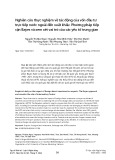

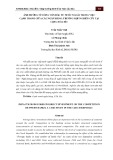
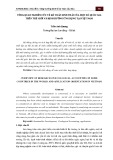
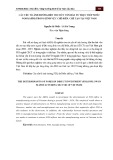
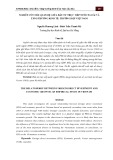
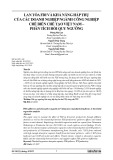
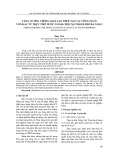




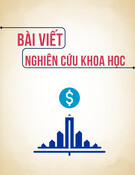




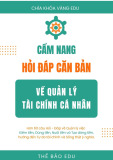
![Đề thi Tài chính cá nhân kết thúc học phần: Tổng hợp [Năm]](https://cdn.tailieu.vn/images/document/thumbnail/2025/20251015/dilysstran/135x160/64111760499392.jpg)

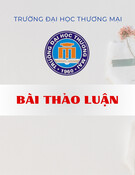
![Câu hỏi trắc nghiệm và bài tập Thị trường chứng khoán [mới nhất]](https://cdn.tailieu.vn/images/document/thumbnail/2025/20251001/kimphuong1001/135x160/75961759303872.jpg)
